
The Zombies are a British rock band formed in St Albans in 1961. Led by keyboardist/vocalist Rod Argent and vocalist Colin Blunstone, the group had their first British and American hit in 1964 with "She's Not There". In the US, two further singles—"Tell Her No" in 1965 and "Time of the Season" in 1968—were also successful.

Astro-Creep: 2000 – Songs of Love, Destruction and Other Synthetic Delusions of the Electric Head is the fourth and final studio album by American heavy metal band White Zombie, released on April 11, 1995, by Geffen Records. The album proved to be their most commercially successful recording, peaking at number six on the Billboard 200 with the aid of the popular hit singles "More Human than Human" and "Super-Charger Heaven". It was the band's only studio album to feature John Tempesta on drums.
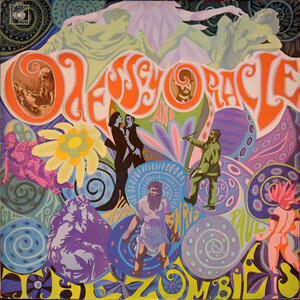
Odessey and Oracle is the second studio album by English rock band the Zombies. It was originally released in the UK in April 1968 by CBS Records. The album was recorded primarily between June and August 1967. The sessions took place at EMI and Olympic Studios in London.

"A Whiter Shade of Pale" is a song by the English rock band Procol Harum that was issued as their debut record on 12 May 1967. The single reached number 1 in the UK Singles Chart on 8 June and stayed there for six weeks. Without much promotion, it reached number 5 on the US Billboard Hot 100. One of the anthems of the 1967 Summer of Love, it is one of the most commercially successful singles in history, having sold more than 10 million copies worldwide. In the years since, "A Whiter Shade of Pale" has become an enduring classic, with more than 1,000 known cover versions by other artists.
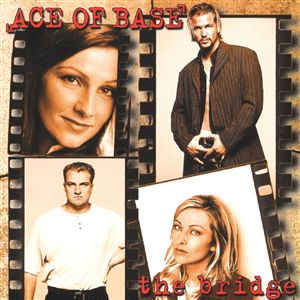
The Bridge is the second album by Swedish pop music group Ace of Base. It was composed during 1994 and 1995, and released in Europe on 30 October 1995. It is the only Ace of Base album to feature sizable contributions of writing, production, vocals, and harmonies by all four band members, each having an important part in its creation.

Colin Edward Michael Blunstone is an English singer and songwriter. In a career spanning more than 60 years, Blunstone came to prominence in the mid-1960s as the lead singer of the rock band the Zombies, which released four singles that entered the Top 75 charts in the United States during the 1960s: "She's Not There", "Tell Her No", "She's Coming Home" and "Time of the Season". Blunstone began his solo career in 1969, releasing three singles under a pseudonym of Neil MacArthur. Since then, he has released ten studio albums under his real name. He appears on several albums with the Alan Parsons Project and sang "Old and Wise".
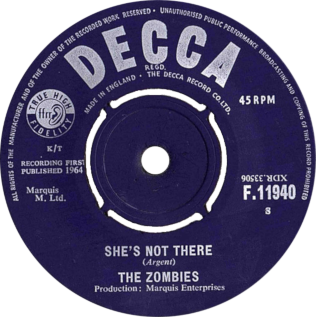
"She's Not There" is the debut single by British rock band the Zombies, written by keyboardist Rod Argent. It reached No. 12 in the UK Singles Chart in September 1964, and No. 2 on the Billboard Hot 100 in the United States at the beginning of December 1964. In Canada, it reached No. 2.

Christopher Taylor White is an English musician.
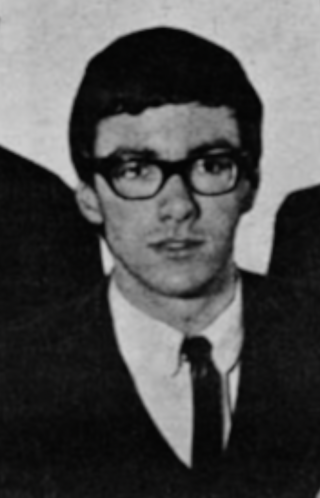
Paul Ashley Warren Atkinson was a British guitarist and record company executive, best known as a founding member of the pop/rock band The Zombies. Atkinson was posthumously inducted into the Rock and Roll Hall of Fame in 2019.

The following is the discography of the American rock band the Doors. Formed in Los Angeles in 1965, the group consisted of Jim Morrison (vocals), Ray Manzarek (keyboards), John Densmore (drums), and Robby Krieger (guitar). The Doors became one of the most popular rock bands of their era. Their debut album, The Doors (1967), released by Elektra Records, charted at No. 2 on the US Billboard 200 and produced the group's most successful single, "Light My Fire". The album received several sales certifications including a four times multi-platinum from both the Recording Industry Association of America (RIAA), and from the Canadian Recording Industry Association (CRIA). The Doors' second studio album, Strange Days (1967), sold well commercially but did not reach the same level of success as the debut, and failed to produce a major hit single. It reached No. 3 on the Billboard 200 and was certified platinum in the United States and Canada. The Doors' third studio album Waiting for the Sun (1968), was very successful, reaching No. 1 in the US and France, and produced their second No. 1 single, "Hello, I Love You". Waiting for the Sun was the first Doors album to chart in the United Kingdom, where it peaked inside the Top 20. The album was certified gold in that country by the British Phonographic Industry (BPI), as well as being certified gold and platinum in several other countries.

"Goin' Out of My Head" is a song written by Teddy Randazzo and Bobby Weinstein, initially recorded by Little Anthony and the Imperials in 1964. Randazzo, a childhood friend of the group, wrote the song especially for them, having also supplied the group with their previous Top 20 Hit "I'm on the Outside ". Their original version of the song was a Billboard Top 10 Pop smash, reaching No. 6 on the Billboard Hot 100, and No. 1 in the Canadian RPM-list in 1965. The song peaked at No. 8 on Cashbox magazine's R&B chart. The Little Anthony and the Imperials original recording is the best-known version of the song, although it has since been covered by many other artists, including the Zombies, who released a rendition as their last single on Decca Records.
Motonari Takano better known as Ai Takano nicknamed Motchin was a Japanese singer and anisong singer. He is best known for his performances of the theme songs for the anime Galactic Whirlwind Sasuraiger, Pettonton, and Kyojuu Tokusou Juspion. Takano also sung the songs in Ai Shite Knight for the fictional in-story band, Bee Hive, even though the singer character, Gou, is voiced by singer Isao Sasaki.
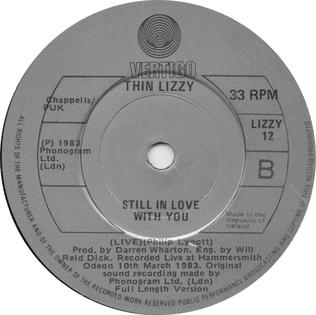
"Still in Love with You" is a song originally recorded by Thin Lizzy. The studio version was first released on their 1974 album Nightlife, and went on to be a live favourite, showcasing the guitarists, including Brian Robertson, Scott Gorham, Gary Moore and John Sykes. Live versions were released on the albums Live and Dangerous, Life, BBC Radio One Live in Concert, The Peel Sessions and One Night Only.
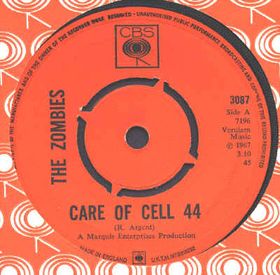
"Care of Cell 44" is a single by the Zombies, from their 1968 album Odessey and Oracle. It was featured on Pitchfork Media's 200 Best Songs of the 1960s list, and has since been covered by modern artists including Elliott Smith and Of Montreal.

"Just Out of Reach" is a song written by singer Colin Blunstone, first recorded by his band the Zombies in 1965. In 1965, it was clear that the Zombies were going to be featured in Otto Preminger's 1966 movie Bunny Lake Is Missing. Therefore, the band had struck a deal with Preminger; he wanted three new songs by the group, recorded in the span of only ten days. During this time, the band's primary songwriters, keyboardist Rod Argent and bassist Chris White suffered somewhat from writer's block. Although White had already managed to come up with two songs, "Remember You" and "Nothing's Changed", the third song was still missing, much to the group's disappointment. Therefore, Blunstone was tasked with the final song.
Mi-Ke were an award-winning J-Pop idol group in the early 1990s. Formed as the chorus group for B.B.Queens under Being Inc. recording agency, they had several singles which made the music charts, and released a number of albums.

"Leave Me Be" is a song written by British bassist Chris White and recorded by his band the Zombies. Following the release of their debut single "She's Not There" in July 1964, White wrote a handful of songs in between performances during the band's heavy schedule. Most of the work on the song occurred in August 1964, when the Zombies recorded both a demo and the backing track for it. The instrumentation largely differs from both earlier and later Zombies records; it features electric organ played by Rod Argent, compared to his previous usage of the electric piano. Together with record producer Ken Jones, they returned in September to finish the vocal track, which was disliked by most band members for its similarity to "She's Not There"; the vocals would eventually be re-recorded a few months later.
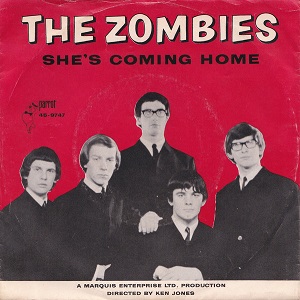
"She's Coming Home" is a song written by keyboardist Rod Argent recorded by his band the Zombies. The song has early origins in Argent's life; he lifted segments from the 1946 song "Magnificat and Nunc dimittis" which he had heard in boy choir. Characterized by its unusual chord progression, the song was recorded on 2 March 1965 during a three-hour session held at Decca Studios along with several other tracks, all of whom were by their standard producer Ken Jones, who knew what Argent had looked for in the song and attempted to produce it in that style.

"I Want You Back Again" is a song written by keyboardist Rod Argent and originally recorded by his band the Zombies. Initially laid down during a session at Decca Studios on 25 November 1964, the group was unsatisfied with the result and the song was not re-recorded until 2 March 1965, together with several other songs. The song largely departs from the soft rock sound of their earlier singles and ventures into jazz rock. Characterized by an unusual rhythmic melody, the song was liked by lead vocalist Colin Blunstone, who didn't like the genre.

"Whenever You're Ready" is a song written by English keyboardist Rod Argent, first recorded by his band the Zombies. Following an American tour in April 1965 supporting their then single "She's Coming Home", the band were disappointed in finding out it had been a chart failure. After the follow-up "I Want You Back Again" was an even less commercial song, pressure from the group's management came forward in order for them to write a commercial song in the style of their earlier singles, which had been hits.



















